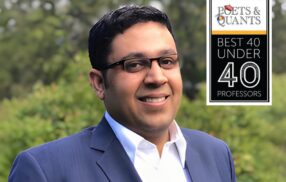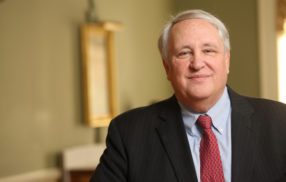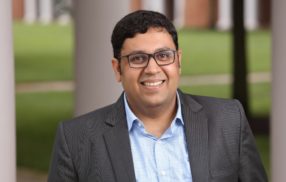
Climate Change, Averting a Debt Crisis and Superpower Relations: World Leaders Make the Case for Global Collaboration at UVA Darden
By Dave Hendrick and Jay Hodgkins
In a new era many have described as “deglobalization” for the more regional and isolationist stances certain nations have adopted, reversing a decades-long trend toward globalization, the importance of global cooperation might seem to be waning.
But world leaders from the U.S. Senate, World Bank Group, U.S. Department of State and the private sector descended virtually on the University of Virginia Darden School of Business in March to make the case that global collaboration is as important as ever to maintain stability and prosperity in a world beset by the coronavirus pandemic, economic and debt challenges, and the looming threat of climate change.
The speakers led classes in Professor Alan Beckenstein’s new course “Global Collaboration,” and provided students with insights about the key role institutions and business can play solving the most difficult societal challenges through global collaboration — and the dire consequences if institutions fail to cooperate.
Former Senator Encourages Greater ‘Accommodation’ in U.S.-China Relationship
Former Montana Senator Max Baucus detailed his unlikely path from a Montana ranch to national leadership and global diplomacy.
Baucus, who offered remarks titled “Understanding Potential US-China Decoupling: Macro Trends, Industry Impacts, and Governmental Engagement,” said a semester spent in France and hitchhiking around the world as a college student planted the seeds for an interest in public service, an interest that would manifest as a member of the Montana House of Representatives, the U.S. House of Representatives, the U.S. Senate and eventually as U.S. Ambassador to China during the Administration of President Barack Obama.
The relationship between China and the U.S. has evolved — and arguably deteriorated — since Baucus led diplomatic efforts. At the time, Baucus, who helped ease the path for China to join the World Trade Organization, said he was among those who believed that “the more we worked with China, the more they are apt to be like us.” In hindsight, the attitude was “a bit presumptuous,” Baucus said.
“China is China — they are going to do their own thing,” said Baucus. “We need to figure out how to get along with each other. That’s where we are now.”
Chinese leadership wants to work with the U.S., Baucus said, but on its own terms. The chief interest of Chinese President Xi Jinping is continued economic growth and income growth for China’s population, and the country’s ambitions should be seen through that lens.
The former ambassador said important, and relatively easy, first steps toward more productive relations between the two countries would be the reopening of consulates closed in 2020 and loosening of visa restrictions.
Baucus said he’d encourage leaders of both countries to practice “more accommodation and more respect” when forging a more amicable relationship.
Baucus’ advice for Darden students: Seek opportunities to get out of your home country and go learn about and see the world while you can.
Climate Change the Ultimate Opportunity, Challenge for Global Collaboration
Alcade & Fay CEO and Vice Chairman Kevin Fay says he has been involved with every major international effort to address climate change, from the talks that led to the creation of the United Nations Framework Convention on Climate Change and the Kyoto Protocol in the 1990s to the near-disastrous Copenhagen negotiations in 2009 and the landmark Paris Agreement in 2016.
Through his decades leading private sector efforts to shape climate policy, he says the pendulum swings and difficulty bringing all nations together through negotiations are frustrating.
“When you’re working on something that has the potential to reorder the entire global economy, it gets people nervous,” Fay said.
However, when he looks back and sees how much progress has been made, he’s encouraged by the success of global climate efforts. He said he’s also encouraged by the “fantastic progress” the private sector at large is making in taking the imperative for climate action seriously.
But aside from any moral imperative for businesses to take action, Fay said its critical for the private sector to remain involved in the policy process so that it can understand and shape the rules in order to protect shareholder value and remain viable while transitioning to a low-carbon future.
Making global collaboration to address the climate challenge so difficult is the tactic of critics to throw every criticism they can think of against the wall until one sticks. For example, Fay said there was no call to include developing countries like China in climate commitments in the early 1990s. However, critics of the Kyoto Protocol found that highlighting China’s exclusion was an effective attack.
“This points to the difficulty of the treaty process and action,” Fay said. “It’s easy for these treaties to be attacked and, therefore, hard to preserve the political will for them to survive and achieve their aims.”
Former Head of World Bank Looked to History to Inform Policy
Robert Zoellick, former president of the World Bank and U.S. deputy secretary of state, cited examples from his career when he drew upon history to inform action around policy, specifically in the cases of the unification of Germany, the negotiation of the North America Free Trade Agreement and prioritizing initiatives when helming the World Bank.
Joining the World Bank at a tumultuous time, Zoellick said he sought to refocus on the reason people joined the bank: to aid the developing world.
Beyond the perennial challenge of assisting the world’s poorest countries, Zoellick said he tried to instill a focus on middle-income countries that needed less finance aid and more assistance in developing “know-how” and institutional capabilities; renewed attention on the Arab world; and the diffusion of knowledge more broadly, in addition to financial aid.
Although circumstances change, there is often precedence than can guide actions, Zoellick suggested.
“History can offer insights on how to do better, rather than the acceptance of timeless obstacles,” said Zoellick. He added that, when forging policy or negotiating in the business world, it was “okay to have imperfect results.”
‘Shocking’ Global Debt Crisis Looms, Global Collaboration Can Help Avert Catastrophe
Dr. Ayhan Kose, acting vice president of equitable growth, finance and institutions with the World Bank, says the world is in the midst of a historic “fourth wave” of global debt spending.
The previous wave ended in 2009 following the global financial crisis, but began building almost immediately following the end of emergency debt reduction actions and austerity efforts. Kose called this latest wave “shocking” in size.
For advanced economies, it’s the largest increase in debt since the 1970s. For emerging economies, it’s the largest since the 1980s.
“We are going through a period like we have never seen in modern history,” Kose said. “When we have these debt-accumulation moments, there is a 50 percent chance of a crisis. That’s why the global community is trying to find ways to address these issues as soon as possible.”
The fourth wave has been driven by a long run of incredibly low interest rates, which have made it relatively easy for nations and the private sector to service obligations on increasing debt loads. However, interest rates inevitably will rise, Kose warned, and rising rates hit the most vulnerable borrowers first and hardest.
Kose, a Darden lecturer who recently helped teach a course on managing through the coronavirus pandemic, said the response of the World Bank Group so far has been the Debt Service Suspension Initiative, which invites countries struggling to pay their debt to seek forbearance and forgiveness from creditors. However, he acknowledged a number of limitations, including nations passing on the opportunity out of fear they will alienate creditors and creditors choosing not to ease terms for countries that request help through the initiative.
The initiative is also a short-term solution and only targets the poorest nations, but Kose said this wave of debt will pressure economies of all sizes and resources.
“The bottom line is that countries are at a crossroads,” Kose said. “Which path they take will determine whether we see a thunderstorm of debt crises or see better days. What the World Bank and IMF are doing to the best of their ability is to help economies and put them in a better position.”
The University of Virginia Darden School of Business prepares responsible global leaders through unparalleled transformational learning experiences. Darden’s graduate degree programs (MBA, MSBA and Ph.D.) and Executive Education & Lifelong Learning programs offered by the Darden School Foundation set the stage for a lifetime of career advancement and impact. Darden’s top-ranked faculty, renowned for teaching excellence, inspires and shapes modern business leadership worldwide through research, thought leadership and business publishing. Darden has Grounds in Charlottesville, Virginia, and the Washington, D.C., area and a global community that includes 18,000 alumni in 90 countries. Darden was established in 1955 at the University of Virginia, a top public university founded by Thomas Jefferson in 1819 in Charlottesville, Virginia.
Press Contact
Molly Mitchell
Associate Director of Content Marketing and Social Media
Darden School of Business
University of Virginia
MitchellM@darden.virginia.edu






